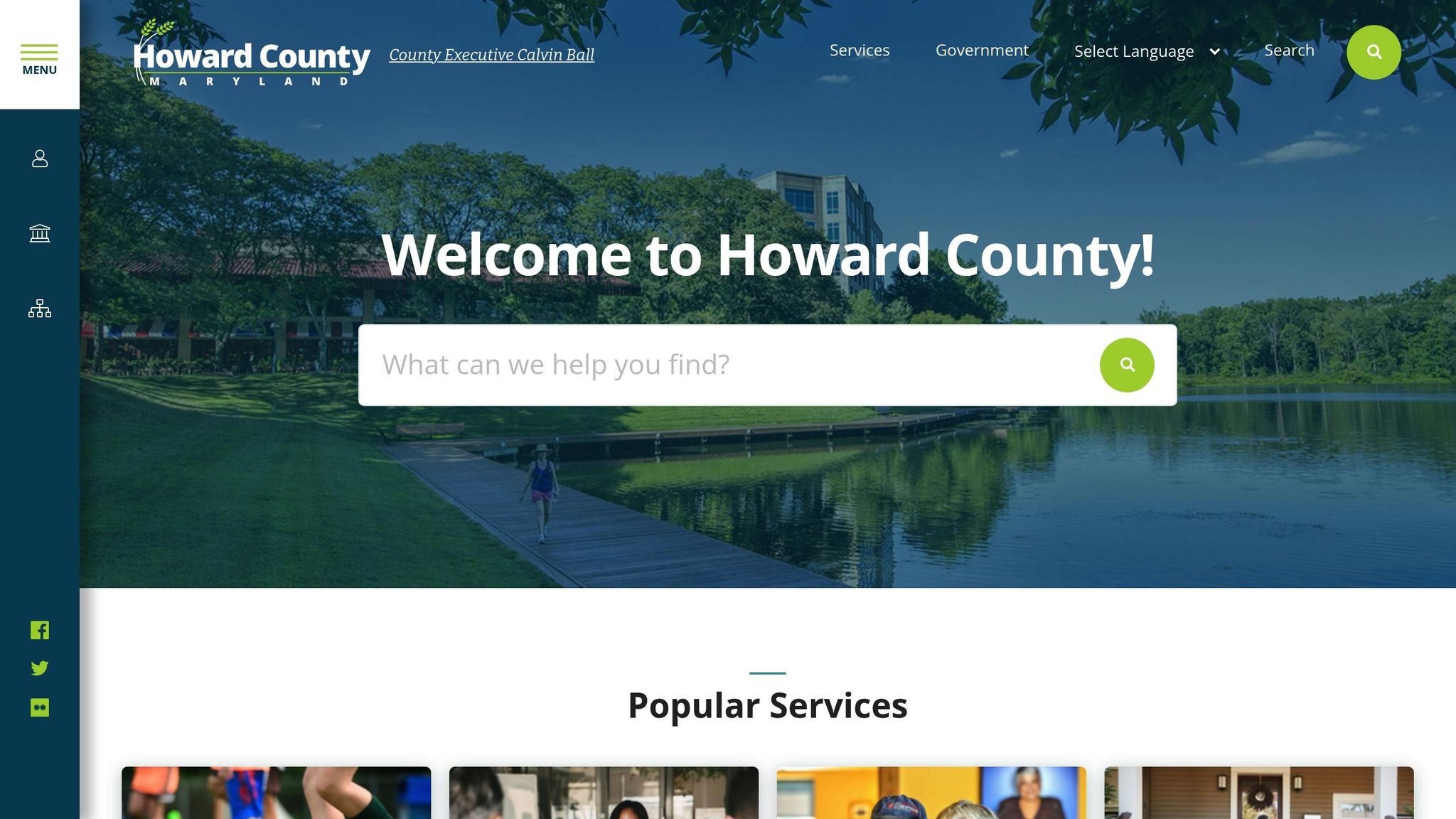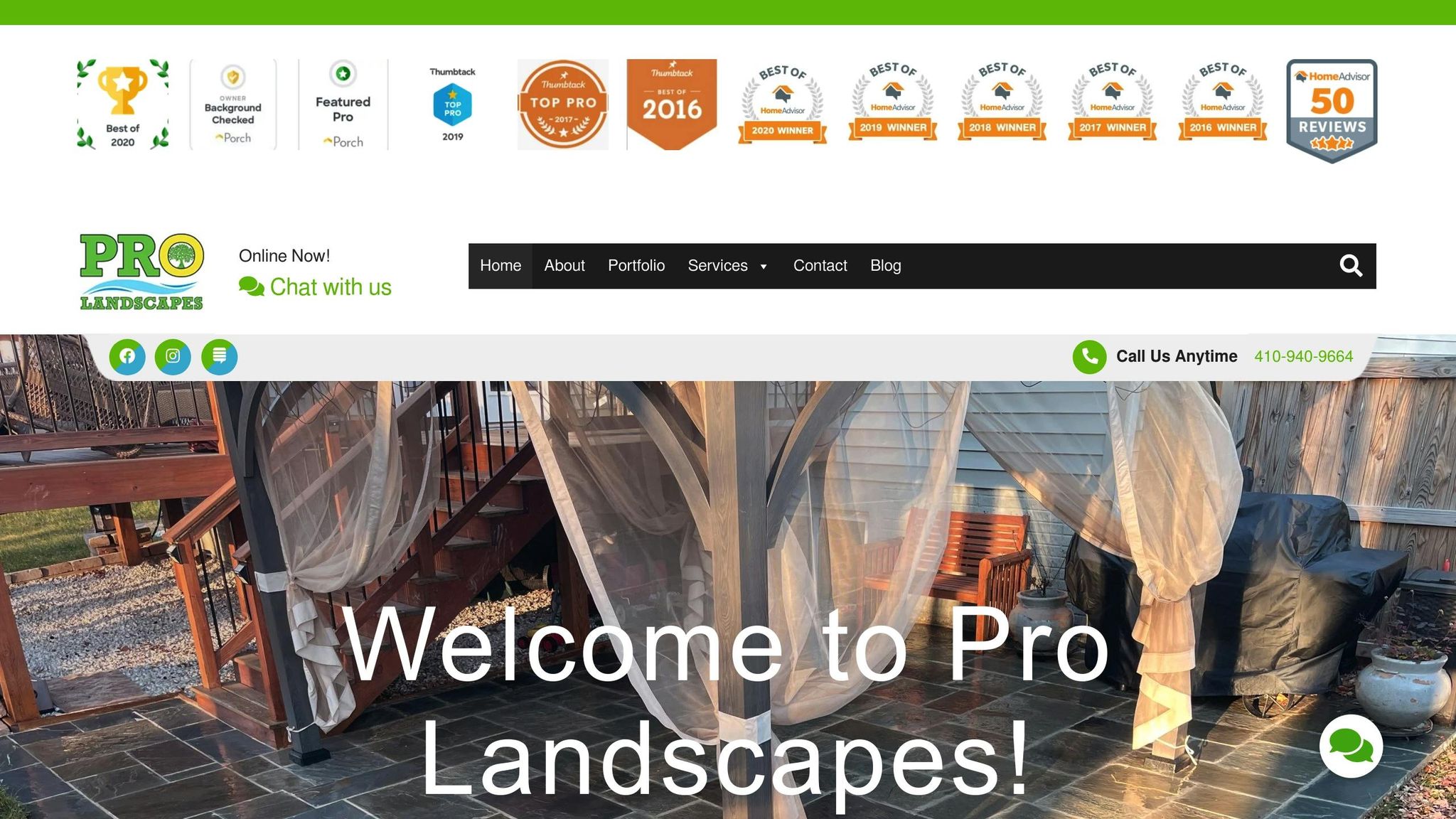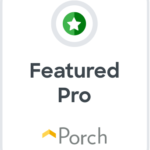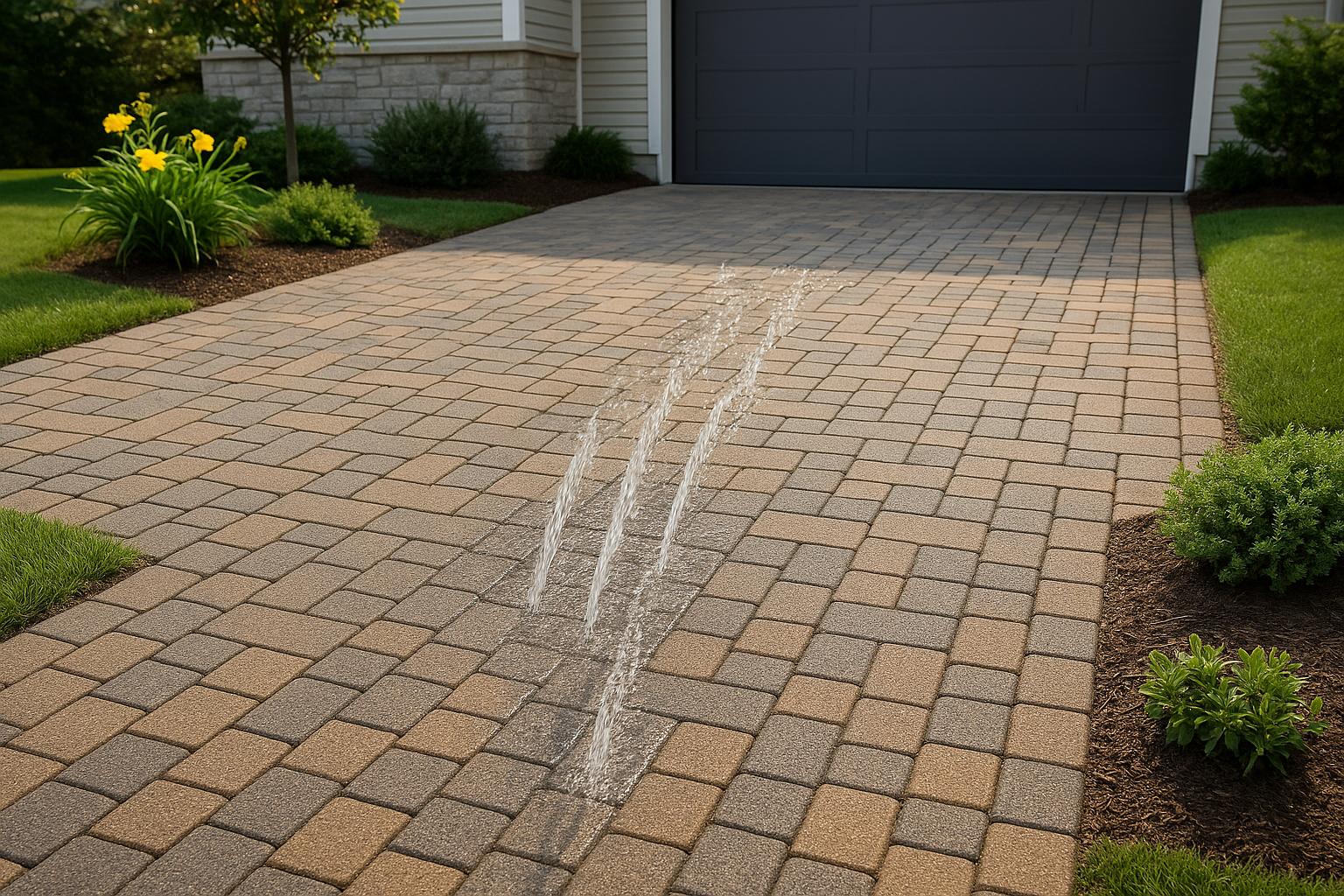- bhavya gada
- No Comments
Permeable pavers are a practical solution for managing stormwater runoff in Howard County. These pavers allow rainwater to filter through the ground, reducing pollution and protecting local waterways. The county has specific requirements and incentives to encourage their use, including:
- Permit Requirements: Projects need permits, which can now be submitted electronically through Howard County’s online system.
- Stormwater Standards: Installations must meet technical criteria to manage runoff effectively, with stricter requirements for commercial properties.
- Incentives: The CleanScapes Program offers up to 100% reimbursement for eligible installations, making these projects more affordable.
- Maintenance: Regular upkeep, such as cleaning and inspections, is required to maintain functionality and compliance.
Working with licensed contractors simplifies the process, ensuring adherence to county rules. Properly installed and maintained permeable pavers contribute to better water management while reducing costs through incentives.
Permeable Base Construction – Edu-Series 2021
Howard County Stormwater Management Requirements

Howard County’s Stormwater Management Division (SWMD) oversees water quality and runoff control, ensuring compliance with federal and state regulations that ultimately protect the Chesapeake Bay [3].
The county operates under an NPDES MS4 permit (No. 22-DP-3318 MD0068322), issued by the Maryland Department of the Environment. This permit, effective from December 30, 2022, to December 29, 2027, sets specific standards for pollution prevention and water quality management [4]. To meet these standards, Howard County submits annual compliance reports, which cover activities like construction in flood-prone zones and detailed watershed restoration plans.
Since July 1, 2017, the county has mandated that all public and private Best Management Practices (BMPs) and storm drain systems include digital design data with development plans [4]. This requirement ensures that stormwater management is integrated into projects right from the planning phase. These regulations highlight the importance of solutions like permeable pavers in achieving stormwater goals.
How Permeable Pavers Contribute to Stormwater Management
Permeable pavers play a vital role in helping Howard County manage stormwater by capturing and filtering runoff. Recognized as an official stormwater management facility, these pavers allow rainwater to seep into the ground instead of rushing off surfaces and carrying pollutants into waterways [1]. This natural filtration process removes contaminants before they reach local streams and rivers, helping the county meet its MS4 permit obligations.
To encourage their use, Howard County has made permeable pavers eligible for reimbursements and credits under the Watershed Protection Fee program. This incentive underscores the county’s commitment to promoting systems that align with regional water quality goals [5].
Project Requirements for Permeable Paver Installations
To qualify for Watershed Protection Fee credits, permeable paver installations must meet strict technical criteria. Howard County’s standards, based on the 2000 Maryland Stormwater Manual, require that these systems effectively manage runoff from impervious surfaces [5]. Whether the project is residential or commercial, the design must handle a specified amount of water runoff.
For commercial properties, the requirements are more rigorous. Applicants must submit engineered calculations showing the treated impervious surface area, and these calculations must be approved by a licensed engineer [5]. This ensures that larger projects can manage the higher volumes of runoff they generate.
While residential installations have simpler requirements, they still need to meet the county’s technical standards for design and performance. Adhering to these guidelines not only secures regulatory approval but also makes the project eligible for local incentives. Whether it’s a small backyard patio or a large commercial parking lot, the key is ensuring the system can effectively capture and filter runoff specific to the site.
Permits and Documentation for Permeable Paver Projects
If you’re planning a permeable paver project in Howard County, you’ll need to coordinate with the Department of Inspections, Licenses and Permits (DILP). Depending on the scope of your project, you may require a general building permit or a grading permit. Howard County has integrated this process with its digital initiatives, making it easier to get started[6].
How to Apply for a Permit
Since August 2023, Howard County has fully transitioned to electronic submissions for residential and commercial permits, simplifying the process for both homeowners and contractors[6].
To start, visit the DILP Online Permitting Services Webpage. This platform walks you through the application steps and allows you to upload the necessary documents online[6]. If your project involves significant earthwork or changes to property grading, you’ll likely need a grading permit, which can also be applied for and paid through the same system[6].
Beginning February 1, 2025, merchant service fees for credit card or ACH payments will be displayed during the checkout process[6].
For more complex land development projects, use the ProjectDox Web Tool. This tool, which became the standard for submitting petitions and plans as of June 28, 2024, enables electronic submissions for larger-scale projects[7].
Documents You Need to Submit
The required documentation for permeable paver projects revolves around Howard County’s "Plan Submission Requirements." These include forms, applications, and checklists designed to ensure your project aligns with county standards[7].
One key document is the Operation & Maintenance Schedule for Permeable Pavements. This schedule, listed under the county’s Environmental Site Design requirements, outlines how you will maintain your permeable pavers to keep them functioning effectively as a stormwater management system[7].
You’ll also need to submit site and concept plans, along with proof that your project complies with Howard County’s stormwater guidelines[7]. If you have questions about specific documents, reach out to the Planner of the Day at 410-313-2350 for assistance[7].
Howard County Incentives and Reimbursement Programs
Howard County makes installing permeable pavers more affordable through its CleanScapes Incentive Program. This program offers financial reimbursements to offset installation costs, making it easier for homeowners to invest in environmentally friendly solutions.
CleanScapes Incentive Program Details
Since its launch in November 2011, the CleanScapes Program has aimed to reduce stormwater pollution and runoff [11–13]. Permeable pavers are recognized as an approved Best Management Practice (BMP) under the program, which qualifies them for financial incentives [8].
To participate, your home must have been built before 2003, and you must either own the property or have the homeowner’s permission if you are renting. Additionally, installations must be completed by a licensed contractor with experience in CleanScapes projects [12,13].
The application process is competitive due to limited availability. Each year, the Site Visit Request Form opens on April 1, offering just 75 spots that are typically claimed quickly [11,12]. If you miss this initial window, there’s still a chance to participate by working with Watershed Stewards or BayWise Master Gardeners to conduct a site visit and submit a report by September 14 [8].
How Much Money You Can Get Back
The CleanScapes program can significantly reduce the financial burden of installing permeable pavers. There are two levels of reimbursement:
- Up to 100% reimbursement: Available for households with incomes at or below 250% of the federal poverty level, as defined by the U.S. Department of Health and Human Services [8].
- 75% reimbursement: Applies to other approved projects, covering most of the installation costs [9].
For example, a typical project costing $3,000–$4,000 might only leave you with $800–$1,000 in out-of-pocket expenses. However, it’s important to note that reimbursement covers installation costs only, so you’ll need to budget for ongoing maintenance separately.
How to Apply for Reimbursement
To start, secure one of the limited spots by submitting the Site Visit Request Form on April 1. These spots fill quickly, so early action is key [11,12].
Before applying, carefully review the program’s qualifications and deadlines on the CleanScapes website. Once your site visit and project design are approved, complete the installation within the specified timeframe. Afterward, submit your reimbursement claim with all required documentation, including receipts, contractor certifications, and proof of compliance with Howard County’s stormwater standards.
As an added bonus, participating homeowners can also reduce their Watershed Protection Fee, further lowering overall costs [12–14].
With these incentives in place, all that’s left is ensuring your project meets the county’s requirements for stormwater management.
sbb-itb-843f8be
Installation and Maintenance Standards
Getting your installation right and staying on top of upkeep are key to meeting Howard County regulations and keeping your eligibility for CleanScapes incentives intact.
Installation Requirements
Howard County mandates that all CleanScapes projects be handled by a licensed contractor [8]. As part of the program, the county provides a "Permeable Pavers Project Detail Sheet", which lays out the technical requirements your contractor must follow. This includes details like sub-base preparation, drainage specifications, and material standards. Before moving forward, review this sheet carefully and double-check that your contractor’s estimate covers every necessary component.
During installation, your contractor must excavate to the appropriate depth and use the right aggregates to prepare the base layer. Proper drainage connections are also critical to manage stormwater runoff in line with county standards. Once the installation is complete, the focus shifts to ongoing maintenance to keep the system performing as intended.
Ongoing Maintenance Requirements
After installation, regular maintenance is essential – not just for keeping your system running smoothly but also for staying compliant with county regulations and maintaining CleanScapes incentives.
Routine cleaning and inspections are necessary to prevent clogging and ensure the system filters pollutants effectively [10]. Keep the paver joints free of debris, leaves, and sediment by using vacuuming or pressure washing techniques. This helps maintain proper water infiltration.
If you’re benefiting from Watershed Protection Fee credits, keep in mind that these must be recertified every three years [5][11]. During recertification, Howard County will inspect your system to confirm it’s still functioning as it should. Poor maintenance that causes your system to fail inspection could lead to losing these credits.
What Happens If You Don’t Follow the Rules
Skipping maintenance doesn’t just hurt your system – it can also hit your wallet. Property owners who fail to meet stormwater management regulations may face fines or penalties [10][2].
If you received CleanScapes reimbursement, you’re also bound by a maintenance agreement with the county [5][11]. Non-compliance with this agreement could result in losing your Watershed Protection Fee credits. Beyond that, neglected maintenance can cause your system to deteriorate, leading to expensive repairs or even full replacement.
Working with Local Experts: Pro Landscapes MD

Navigating the maze of county regulations can make or break your landscaping project. Selecting the right professionals is key to avoiding costly compliance missteps and ensuring a smooth process from start to finish. That’s where local expertise becomes invaluable – it simplifies the entire journey, from initial design to project completion.
Why Partner with Pro Landscapes MD
Pro Landscapes MD specializes in hardscaping and stormwater management, offering the expertise needed to handle Howard County’s strict regulations. They take care of everything, from securing permits to ensuring your project complies with local codes.
Their deep understanding of the area’s unique soil and drainage conditions allows them to deliver customized solutions that work. By prioritizing compliance, they help you avoid penalties and unexpected expenses. Beyond installation, they offer ongoing maintenance and inspections, ensuring your system remains efficient and meets county standards over time.
What Pro Landscapes MD Offers
Pro Landscapes MD delivers comprehensive services tailored to Howard County projects, including:
- Permeable Paver Solutions: They design and install patios, walkways, and driveways using environmentally friendly pavers that enhance stormwater management while adding aesthetic appeal.
- Drainage and Stormwater Management: From preparing the sub-base to installing drain pipes and leveling the land, they ensure water flows correctly and efficiently throughout your system.
- End-to-End Project Management: They handle every step, working closely with Howard County officials to ensure your project meets all requirements and passes inspections the first time.
- Maintenance and Compliance Support: Regular maintenance schedules keep your system running smoothly and compliant with local standards, giving you peace of mind long after the project is complete.
Pro Landscapes MD’s attention to detail and local expertise make them a trusted partner for tackling complex landscaping projects while staying on the right side of county regulations.
Conclusion
Howard County’s permeable paver installations come with responsibilities that go beyond aesthetics – they are officially classified as stormwater management facilities. This means they require strict adherence to county regulations, permits, and routine maintenance, including inspections every three years to ensure compliance.
To get started, you’ll need to understand the county’s specific stormwater management requirements and secure the necessary permits. Programs like CleanScapes may offer financial incentives, but keep in mind that maintaining these systems is an ongoing responsibility. Homeowners are tasked with ensuring their pavers remain functional and meet local standards.
Working with experienced professionals, such as Pro Landscapes MD, can simplify the process. Their expertise covers everything from design and permitting to installation and maintenance, ensuring your system performs well even in Maryland’s unpredictable climate. This partnership can help you navigate Howard County’s regulatory requirements while maximizing the environmental and financial return on your investment.
Permeable pavers do more than enhance your property – they reduce flooding, improve water quality, protect wildlife habitats, and contribute to countywide environmental goals. When installed and maintained correctly, they boost both the functionality and value of your property. Achieving success with permeable pavers means understanding the rules, securing the right permits, and relying on local experts to guide you through the process.
FAQs
What permits do I need to install permeable pavers in Howard County, and how can I apply for them?
To install permeable pavers in Howard County, you’ll likely need a stormwater management permit or a grading permit to meet local regulations. These permits are designed to ensure that stormwater runoff is properly managed and erosion is controlled during and after the project.
You can obtain these permits through the Howard County Department of Inspections, Licenses, and Permits. Before diving into your project, it’s smart to double-check the specific requirements and understand any inspection steps involved. For detailed information, reach out to the department directly or explore their website.
If handling the process feels overwhelming, you might want to consider working with professionals like Pro Landscapes MD. They specialize in eco-friendly hardscaping solutions, including permeable paver installations, and can guide you through the permitting process while helping you create an outdoor space that matches your vision.
What are permeable pavers, and how do they help with stormwater management in Howard County?
Permeable pavers are a type of paving material designed to let water flow through their surface. By allowing rainwater to seep into the ground instead of running off, they help filter out pollutants, recharge groundwater, and manage stormwater more effectively – especially during heavy downpours.
In Howard County, these pavers must meet specific technical requirements, including a perviousness rate of 10% to 50%. Proper installation, following the manufacturer’s guidelines, is crucial to ensure they work as intended for water infiltration and pollutant filtration. These systems can cut stormwater runoff by as much as 85% during typical rain events, offering a smart, eco-conscious way to manage water on your property.
What maintenance do permeable pavers need to comply with Howard County regulations and qualify for CleanScapes incentives?
To ensure your permeable pavers stay in line with Howard County regulations and qualify for CleanScapes incentives, regular upkeep is essential. Clear away sediment, leaves, and debris often to prevent blockages and allow water to flow through as intended.
It’s also important to check the pavers regularly for any signs of damage or uneven surfaces. Fixing these issues quickly will not only keep them functional but also maintain their appearance. Staying on top of maintenance helps extend their life and keeps you eligible for local incentives.


















Chat with Us